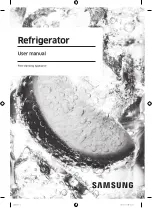
12
Adjusting Controls
The mid-settings indicated in the previous section should be
correct for normal household usage. The controls are set correctly
when milk or juice is as cold as you like and when ice cream is
firm.
If the temperature is too warm or too cold in the refrigerator or
freezer, first check the air vents to be sure they are not blocked.
If you need to adjust temperatures, use the settings listed in the
chart below as a guide. On models with two controls, adjust the
refrigerator temperature first. Wait at least 24 hours between
adjustments and then recheck the temperatures.
Crisper Humidity Control
(on some models)
You can control the amount of humidity in the moisture-sealed
crisper. Adjust the control to any setting between LOW and HIGH.
LOW (open) for best storage of fruits and vegetables with skins.
HIGH (closed) for best storage of fresh, leafy vegetables.
Ice Maker
Turning the Ice Maker On/Off
To turn the ice maker ON, simply lower the wire shutoff arm.
To manually turn the ice maker OFF, lift the wire shutoff arm to the
OFF (arm up) position and listen for the click.
NOTE: Your ice maker has an automatic shutoff. As ice is made,
the ice cubes will fill the ice storage bin and the ice cubes will
raise the wire shutoff arm to the OFF (arm up) position. Do not
force the wire shutoff arm up or down.
Ice Production Rate
■
Allow 24 hours to produce the first batch of ice. Discard the
first three batches of ice produced.
■
The ice maker should produce approximately 8 to 12 batches
of ice in a 24-hour period.
■
To increase ice production, lower the freezer and refrigerator
temperature. See “Using the Controls.” Wait 24 hours
between adjustments.
■
For maximum ice production (on some models), push the
switch to OptimIce. The ice maker should produce 16 to
20 batches of ice in a 24-hour period in the OptimIce mode.
Remember
■
The quality of your ice will be only as good as the quality of the
water supplied to your ice maker. Avoid connecting the ice
maker to a softened water supply. Water softener chemicals
(such as salt) can damage parts of the ice maker and lead to
poor quality ice. If a softened water supply cannot be avoided,
make sure the water softener is operating properly and is well
maintained.
■
Never use anything sharp to break up the ice in the bin. This
can cause damage to the ice container and the dispenser
mechanism.
■
Do not store anything on top of or in the ice maker or ice bin.
Water Dispenser
IMPORTANT:
■
After connecting the refrigerator to a water source, flush the
water system by dispensing water into a sturdy container until
you draw and discard 2 to 3 gal. (8 to 12 L) of water, or for
approximately 5 minutes after the water begins dispensing.
The flushing process cleans the water system and clears the
air from the lines. As the air is cleared from the lines, water
may spurt out of the dispenser.
■
Allow several hours for the refrigerator to cool down and chill
water.
■
Dispense enough water every week to maintain a fresh supply.
To Dispense Water:
There are two water dispenser buttons for use with different sizes
of containers.
1. Press a sturdy glass against the back button or hold a
container under the dispenser while pressing the front button.
2. Remove the glass or release the front button to stop
dispensing.
CONDITION/REASON:
ADJUSTMENT:
REFRIGERATOR too warm
REFRIGERATOR or
TEMPERATURE Control one
setting higher
FREEZER too warm/too
little ice
FREEZER or TEMPERATURE
Control one setting higher
MAX ice production switch
REFRIGERATOR too cold
REFRIGERATOR or
TEMPERATURE Control one
setting lower
FREEZER too cold
FREEZER or TEMPERATURE
Control one setting lower
OptimIce
NORMAL
Cut Hazard
Use a sturdy glass when dispensing ice or water.
Failure to do so can result in cuts.
WARNING
Содержание 2302428
Страница 16: ...16 WATER FILTER CERTIFICATIONS ...













































